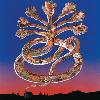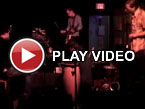Cyclobe, "Wounded Galaxies Tap at the Window"
 There are very real reasons why Cyclobe albums are so infrequent, as Ossian Brown and Stephen Thrower seem to deliberately eschew or expertly conceal most of the tools that similar artists rely upon (improvisation, chance/randomness, repetition, etc.) in favor of a constantly shifting and deliberate abstract narrative. There is a purposefulness and articulation to Cyclobe’s brand of psychotropic mindfuckery that is very much their own. Their best work (such as this album) feels like a twisted, meticulously composed infernal symphony or an ambitiously nightmarish film soundtrack for a film that no one could possibly make. Wounded Galaxies evokes something far too extreme and abstract to capture with words and images: a deep, timeless, all-consuming cosmic terror.
There are very real reasons why Cyclobe albums are so infrequent, as Ossian Brown and Stephen Thrower seem to deliberately eschew or expertly conceal most of the tools that similar artists rely upon (improvisation, chance/randomness, repetition, etc.) in favor of a constantly shifting and deliberate abstract narrative. There is a purposefulness and articulation to Cyclobe’s brand of psychotropic mindfuckery that is very much their own. Their best work (such as this album) feels like a twisted, meticulously composed infernal symphony or an ambitiously nightmarish film soundtrack for a film that no one could possibly make. Wounded Galaxies evokes something far too extreme and abstract to capture with words and images: a deep, timeless, all-consuming cosmic terror.
It is both fitting and remarkable that Brown and Thrower met through their associations with Coil.On one hand, there are enormous similarities between the two groups: a deep fascination with both the occult and obscure transgressive art, overlapping collaborators like Thighpaulsandra, the use of similar electronic textures, and so on.On the other hand, however, Cyclobe has wound up in such a completely different place that it is almost difficult to imagine that the two were ever intertwined.Cyclobe sounds like Coil's id allowed to run rampant.Ossian and Stephen certainly display a predilection for all things eerie and nocturnal, but they seem to be chasing an altogether more difficult, disturbing, snarling, and visceral vision.No one will ever confuse a Cyclobe album with ambient music.
That said, however, the first side of the album begins with some deceptively haunting and beautiful synthesizers that suggest otherwise.That feeling doesn't last long though, as "How Acla Disappeared From the Earth" quickly grows darker and more uncomfortable as more and more sounds fade in.It is one of the shorter works on the album, so it doesn't have much time to evolve; yet it features some truly wonderful gurgling and shivering weirdness in its periphery.The next song, "The Woods Are Alive with the Smell of His Coming," completely eclipses it though.
Cyclobe’s "17-minute Pagan opus" was actually debuted on its own last year as part of an exhibition at The Tate Gallery St. Ives and it is easy to see why: it is not only the centerpiece of the album, it may possibly the defining moment of the duo's career.It is built upon a simple, yet darkly exotic backbone of kalimba and Michael York’s pipes–a foundation that doesn’t change that much over the course of the piece, serving mostly as a rhythmic anchor for the surrounding maelstrom. The real excitement lies in what unfolds on top of it, as I am amazed at how many ingenious variations of "all hell breaking loose" Thrower and Brown are able to unleash: violent, discordant cello solos from John Contreras; squealing strings that sound like the swirling spirits of the damned; horrific orchestral cacophonies; and a deep creaking like the very fabric of the universe is straining and about to rupture.It is, quite simply, an utterly staggering work.
The album's second half again begins in much calmer, uncharacteristically droning fashion with "We'll Witness the Resurrection of Dead Butterflies," but its opening motif is quickly subsumed by Cliff Stapleton’s Arabic-sounding hurdy-gurdy permutations.The piece eventually reaches a bit of a lull before being torn apart by a violent series of apocalyptically crushing stabs of ugly harmony separated by quivering aftershocks.It feels like the actual earth is shuddering in terror–loud, unexpected, visceral, and awesome.
Gradually, the relentless bludgeoning gives way to some less alarming subterranean moans and rumbles and a delicately haunting piano theme takes shape over a buzzing bed of squiggling electronics.The piano piece is "Sleeper," but it is difficult to tell quite where it officially begins due to my inability to pinpoint the moment of segue."Sleeper" is something of an aberration for the album, as it actually features some odd and creepy childlike vocals from Ossian Brown.In all other respects though, it fits in quite nicely, as the piano gradually becomes more chromatic and unmoored and the underlying music begins to lurch and swell thunderously.The title piece follows, perfectly closing the album by mangling a simple drone piece into massive swells and jarring paroxysms of dissonance.It actually has a disturbingly post-coital feel to it at times.I am curious about whether or not that was intentional, as Thrower has stated in the past that he feels that there is a "capricious sensuousness" to Cyclobe's music.It is difficult and a bit unnerving to try to imagine sex as deviant and alarming as Wounded Galaxies though.
The whole thing adds up to a rather overwhelming, unnerving, and utterly absorbing listening experience.I am fairly certain that my heart rate increased quite a bit over the course of the record, as there was no way to remain calm in the face of such disturbed content and violent dynamic shifts.It was kind of like being attacked, actually.That probably isn't an experience that appeals to most people, but Wounded Galaxies is certainly one of the most immediately striking and singular albums that anyone will release this year (and definitely the only album that can be described with phrases like "rapturous cosmic convulsion").I don't think Brown and Thrower are particularly concerned about appealing to "most people" anyway.Despite all of its more overt charms, however, I suspect Galaxies’ greatest achievement may lie in its sheer depth and complexity: there are all kinds of layers and textures that I was far too shell-shocked to appreciate during my first several listens.This is a very hard album to fully process and I don't expect to get tired of it anytime soon.
Sample:
 



